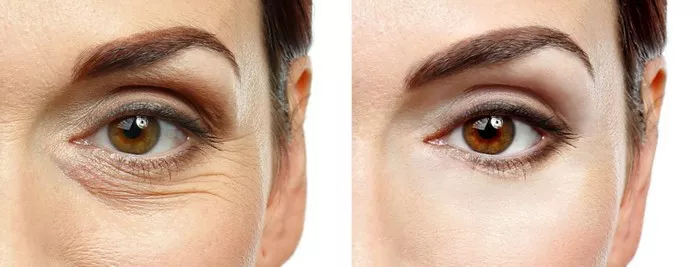Botox, the popular cosmetic treatment, is widely known for its ability to reduce the appearance of fine lines and wrinkles. While it is commonly used on various parts of the face, one area where Botox is particularly effective is around the eyes. The delicate skin around the eyes is prone to developing crow’s feet and other signs of aging, making Botox a sought-after solution. If you are considering getting Botox around the eyes, you may be wondering how long the results will last. In this comprehensive guide, we will explore the longevity of Botox around the eyes and factors that can influence its duration.
Understanding Botox and its Effects
Botox, or botulinum toxin, is a neurotoxic protein that is derived from the bacterium Clostridium botulinum. It works by temporarily paralyzing the muscles in the treated area, which helps to smooth out wrinkles and fine lines. When Botox is injected around the eyes, it relaxes the muscles responsible for causing crow’s feet and other dynamic wrinkles that occur due to repetitive facial movements such as smiling or squinting.
It is important to note that Botox is a temporary solution for wrinkles and fine lines. The effects of Botox typically last for a certain period before the muscles gradually regain their movement. However, the duration of its effects can vary depending on several factors.
Factors Affecting the Duration of Botox around the Eyes
Metabolism and Individual Variations
Each person’s metabolism is unique, and this can impact how long Botox lasts. Some individuals may metabolize Botox more quickly than others, leading to shorter-lasting results. Additionally, the rate at which an individual’s body breaks down Botox can depend on various factors such as age, overall health, and lifestyle habits.
Dosage and Technique
The amount of Botox injected and the technique used by the practitioner can affect the longevity of the treatment. An experienced and skilled practitioner will consider the appropriate dosage based on your specific needs and desired outcome. Proper injection techniques can help ensure that the Botox is placed accurately, increasing its effectiveness and longevity.
Quality of Botox Product
The quality and authenticity of the Botox product used can significantly impact the duration of its effects. It is essential to receive Botox treatment from a reputable and qualified practitioner who uses genuine Botox sourced from a reliable supplier.
Location of Injection
The precise location of the Botox injections can also influence how long the results last. Experienced practitioners will strategically target the muscles responsible for the wrinkles around the eyes, ensuring maximum effectiveness and longevity.
Individual Response to Botox
Each individual’s response to Botox can vary. While most people experience the effects of Botox for a certain period, some may find that it lasts longer or shorter than average due to their unique biology and other factors.
Typical Duration of Botox Effects Around the Eyes
On average, the effects of Botox around the eyes typically last between three to four months. During this time, the treated muscles remain relaxed, reducing the appearance of wrinkles and crow’s feet. However, it is important to note that this is a general guideline, and individual experiences may vary. Some individuals may find that their results last closer to three months, while others may enjoy the benefits of Botox for up to four months or slightly longer.
Maintaining Results and Prolonging the Effects
While the effects of Botox are temporary, there are steps you can take to maintain your results and potentially prolong the effects. Here are some tips to consider:
Follow-up Treatments
To maintain the desired results, many individuals choose to schedule follow-up Botox treatments before the effects wear off completely. By consulting with your practitioner, you can determine the ideal timing for touch-up injections to keep your appearance refreshed.
Practice Good Skincare
Taking care of your skin can help enhance the longevity of Botox results. Follow a skincare routine that includes gentle cleansing, moisturizing, and using sunscreen to protect your skin from harmful UV rays. Additionally, avoid habits that can accelerate skin aging, such as smoking and excessive sun exposure.
Avoid Rubbing or Touching the Treated Area
After receiving Botox injections, it is important to refrain from rubbing or touching the treated area excessively. This can help prevent the spread of Botox to unintended muscles and maintain the desired effects.
Stay Hydrated
Drinking an adequate amount of water and maintaining proper hydration can help support overall skin health and potentially extend the duration of Botox effects.
Lead a Healthy Lifestyle
Adopting a healthy lifestyle can have a positive impact on the longevity of your Botox results. Eating a balanced diet, getting regular exercise, managing stress levels, and getting enough sleep are all factors that can contribute to healthier skin and potentially prolong the effects of Botox.
Consulting with a Qualified Practitioner
Before considering any cosmetic procedure, it is crucial to consult with a qualified and experienced practitioner. They will evaluate your individual needs, discuss your expectations, and determine if Botox is the right treatment for you. A skilled practitioner will take into account various factors such as your medical history, skin condition, and desired outcome to create a personalized treatment plan that aims to achieve optimal results.
In conclusion, Botox is an effective solution for reducing the appearance of wrinkles and fine lines around the eyes. While the duration of its effects can vary among individuals, on average, Botox around the eyes typically lasts between three to four months. By considering the factors that can influence the longevity of Botox and following proper aftercare, you can enjoy the benefits of a refreshed and youthful appearance for an extended period. Remember to consult with a qualified practitioner who will guide you through the process and help you achieve your desired outcome.

